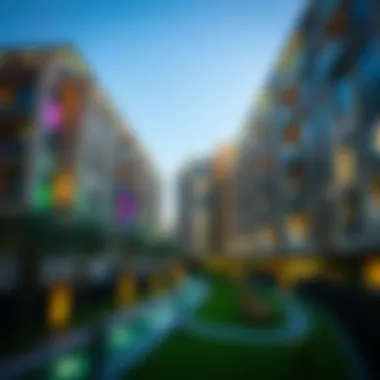Understanding Housing Costs in Dubai: Key Insights


Intro
The housing market in Dubai operates under a unique set of dynamics that can be quite perplexing for those not familiar with its intricacies. In a city that seemingly rises like a phoenix from the desert, the cost of housing is influenced by various factors—from strategic locations to the types of properties available. Understanding these nuances is paramount for anyone looking to invest, buy a home, or rent in this vibrant metropolis.
In this article, we will unpack the complexities of the housing landscape in Dubai. We’ll delve into current market trends, navigate distinct investment opportunities tailored for both seasoned investors and first-time buyers, and clarify the lifestyle implications tied to various residential areas. Through this exploration, the aim is to empower our readers with the knowledge necessary to make informed decisions in what is often a bewildering market.
Navigating the price points in Dubai's real estate sector means considering not just the numbers on paper but also the rich tapestry of life, culture, and economic viability that each neighborhood offers. As the city evolves, so too does the potential for investment within it, making it essential to keep an eye on the shifting tides of market trends.
"Investing in real estate in Dubai is akin to holding a mirror up to the city; what you see may surprise you, and it will certainly reflect a myriad of choices and opportunities."
Let’s begin our journey by examining the current property trends shaping the market.
Current Market Overview
The cost of housing in Dubai represents a dynamic and ever-shifting landscape. Recognizing the current market context is critical for anyone considering an investment or a home purchase in this bustling metropolis. Understanding this overview can empower potential investors, homeowners, and other stakeholders to make informed decisions that align with economic trends and personal needs.
Trends in Property Prices
Over the past few years, trends in property prices in Dubai have exhibited both upward and downward movements, reflecting various local and global economic conditions. The aftermath of the COVID-19 pandemic, for instance, had a chilling effect on prices, as many sought safety in rentals rather than purchases. However, as the city gradually transitioned back to normalcy, a recovery began to unfold.
Currently, average property prices in areas like Dubai Marina and Downtown have seen a noticeable rebound. Various reports indicate increases ranging from 5% to 15% year-on-year in certain districts, driven by renewed investor confidence and an influx of expatriates. It’s worth noting that factors such as new governmental policies, infrastructure developments, and shifting demographics continue to play a crucial role in shaping these price changes.
As an investor, keeping a close eye on these trends can unveil lucrative opportunities. Rental yields, often hovering between 5% to 7%, reflect strong demand, particularly appealing to those looking to invest long-term. The rental market remains buoyant, capitalizing on Dubai's growing reputation as a global hub.
Comparison with Global Markets
When comparing Dubai’s housing market with other global hubs, it showcases a unique paradox. On one hand, prices in areas like Manhattan or London can shoot through the roof, often leaving prospective buyers scratching their heads. In contrast, Dubai offers a competitive range of price points across various districts.
For instance, a comfortable three-bedroom apartment in the heart of Downtown Dubai might set one back approximately AED 2.5 million. On the flip side, similar accommodations in cities like Paris or Los Angeles might command significantly higher prices.
Moreover, the tax-free property appeal in Dubai attracts tier-one investors searching for opportunities without the burden of hefty capital gains taxes prevalent in other regions. This tax incentive positions Dubai favorably and strengthens its appeal as an investment destination.
Ultimately, understanding these patterns enables individuals to gauge the relative affordability and attractiveness of investing in Dubai's housing market compared to global counterparts. In summary, the current landscape of housing costs encapsulates intricate trends and comparisons that can furnish potential buyers and investors with valuable insights, guiding them through the maze of real estate options available in Dubai.
Factors Influencing Home Prices
Location and Accessibility
Proximity to the City Center
When it comes to housing, the saying "location, location, location" often rings true. Proximity to the city center is a crucial element affecting home prices. Properties that sit a stone's throw away from bustling areas tend to command higher prices. Why, you ask? It’s simple: convenience. Living near downtown Dubai offers access to a plethora of options—malls, dining spots, and cultural experiences.
However, living that close comes with its own set of pros and cons. On one hand, residents enjoy higher property values and more investment potential. On the flip side, the hustle and bustle can be overwhelming for some. The rush of city life is not everyone's cup of tea, making these properties both desirable and costly.
Transportation Networks
Another piece of the pie is the transportation networks that crisscross Dubai. Access to metro stations, bus routes, and main highways can fire up the attractiveness of a neighborhood. Locations that boast well-planned public transport options or efficient road access usually see higher demand.
For instance, areas near the Dubai Metro's Green Line have witnessed sharp increases in housing costs. What’s beneficial here is the lowered commuting time for residents, simplifying movements to work and leisure activities. Nevertheless, rushed public transport may lead to congested roads and longer wait times during peak hours, which could detract from the serene living experience some seek.
Property Type Variations
Luxury Villas
Luxury villas are another key aspect of the Dubai housing landscape. The high-end features and exclusive locations they offer can set prices soaring. Think of spacious gardens, private pools, and breathtaking views—these are what many affluent buyers dream of. Luxury properties are typically located in prime spots like Palm Jumeirah or Emirates Hills, appealing to wealthy buyers or investors looking for substantial rental yields.
However, it's worth noting that not all buyers are on the lookout for luxury. Such high prices can push many away, letting only a handful of elite buyers secure such jewels in the market. On the downside, luxury villa properties can also be impacted by economic trends—an economic downturn may slouch demand in this segment, leading to potential price corrections.


High-rise Apartments
High-rise apartments are another feather in Dubai's cap. These skyscrapers not only provide a stunning skyline view but also pack in modern amenities and communal areas, making them very appealing. Their affordability as compared to villas makes them a popular choice, especially among younger professionals and expatriates.
While high-rise living can be convenient, especially for individuals with busy lifestyles, it may come with drawbacks like noise and limited outdoor spaces. On the upside, many of these buildings come with well-managed facilities like gyms, pools, and fine dining options, enhancing the living experience amidst the hustle of city life.
Townhouses
Townhouses typically strike a balance between space and cost, making them a common preference among families looking for a slice of suburban living while still being close enough to city amenities. The family-friendly environment and community feel often make townhouse developments a wholesome choice.
Upsides include decent square footage, often with small yards, catering to those who want a modest outdoor space without breaking the bank. However, the challenge may arise in terms of property maintenance fees, which can be significant in some of these communities.
Market Demand and Supply Dynamics
Investor Confidence
Investors play an integral role in shaping home prices in Dubai. Investor confidence is a vital element of the housing market. When investors feel bullish on the economy or the ability to rent out properties, they’re likely to invest more in real estate, driving prices higher. Factors like government policy and macroeconomic stability can affect this confidence profoundly.
Yet, fluctuating investor sentiment can lead to volatile price changes. If confidence dips, property demand may decrease, leading to falling prices, which can cause a domino effect in the market.
New Developments
The emergence of new developments across the city can swing prices significantly. Areas undergoing new projects often see burgeoning interest, which drives up property value due to the anticipation of enhanced infrastructure and community features. Projects like Dubai Creek Harbour or the Dubai Hills Estate are prime examples where significant investments have catalyzed local real estate prices. But, there’s a double-edged sword to this, as over-saturation in certain segments can lead to drops in prices.
By grasping the intricacies tied to these factors, it emerges that understanding housing prices in Dubai isn’t just about knowing numbers; it’s about zoning into the distinct elements that shape this rapidly-evolving market.
Average Home Prices by District
When it comes to understanding the costs associated with housing in Dubai, examining average home prices by district is crucial. Each area in Dubai has its own character, amenities, and demographic appeal, which directly influences property values. For investors and homeowners alike, knowing these average prices can help in making informed decisions, whether for buying a residence, renting an apartment, or investing in property. In a city as dynamic and diverse as Dubai, the neighborhood you choose isn’t just about lifestyle, but it’s also a big part of your financial strategy.
Let’s dive into the average home prices in some of the most sought-after districts:
Downtown Dubai
Downtown Dubai stands as a hallmark of luxury and modernity. The prices here reflect its iconic status, with properties often being at the higher end of the market. As of now, the average cost of a one-bedroom apartment can range from AED 1.9 million to AED 2.5 million. This district not only offers proximity to the Burj Khalifa and the Dubai Mall but also boasts a vibrant atmosphere that appeals to both families and investors.
- Why invest here? Properties in Downtown Dubai are often seen as sound investments, due to their high demand and the influx of tourists and residents alike.
- Considerations: High property prices might deter some potential buyers, but rental yields are significant, often ranging between 5-7%, making it appealing for those looking to invest in rental properties.
Dubai Marina
Known for its dazzling waterfront and luxurious lifestyle, Dubai Marina draws a diverse crowd. The average price of a two-bedroom apartment varies between AED 1.8 million and AED 3.2 million, reflecting the area's popularity amongst expatriates and high-net-worth individuals.
- Key Elements: The nightlife, dining options, and retail spaces enhance its attraction, particularly for younger professionals.
- Investment Insight: The demand for short-term rentals in Dubai Marina has surged, especially post-pandemic, making it an enticing option for real estate investors wishing to tap into the holiday market.
Jumeirah
Famous for its upscale residential areas and proximity to the beach, Jumeirah stands out as one of the most desirable neighborhoods in Dubai. A villa here can set you back between AED 4 million and AED 10 million, depending on its distance from the coastline and the size of the property.
- Benefits of buying in Jumeirah: The community is family-oriented, featuring excellent schools and recreational facilities, which boosts its property values.
- Considerations: Though luxury has its price, the resale value remains robust due to limited supply of land for new developments.
Business Bay
Situated next to Downtown, Business Bay has become a hotspot for professionals and expatriates working in the city. The average price for apartments here is around AED 1.2 million to AED 2 million for a one or two-bedroom unit.
- Business Appeal: This area caters to a vibrant community of working professionals who thrive on the proximity to offices, making it appealing for renters and investors.
- Market Dynamics: As the business sector continues to grow in Dubai, property values in Business Bay are expected to appreciate, offering potential long-term benefits for buyers.
"Understanding the average home prices in various districts allows potential buyers and investors to strategize better and maximize their investment potential."
In summary, each district in Dubai not only comes with its unique set of characteristics but also presents varied opportunities based on average home prices. Understanding these intricacies will significantly aid in informed decision-making for anyone looking to navigate the complex waters of Dubai’s real estate market.


Whether it's the opulence of Downtown, the allure of Dubai Marina, the family-friendly aura of Jumeirah, or the bustling environment of Business Bay, aligning your investment goals with the district characteristics is key to unlocking the full potential of Dubai's vibrant housing market
For more in-depth information on Dubai's real estate, consider checking out resources at Dubai Land Department or Bayut.
Investment Opportunities in Dubai Real Estate
The realm of real estate in Dubai is as shimmering and diverse as the city itself. With towering edifices and a truly cosmopolitan environment, investors are keenly eying the various opportunities that the market presents. Investment in Dubai real estate can be a game changer, reflecting the city's rapid growth and ever-evolving urban landscape. Various pockets of opportunity exist for those who know where to look and understand the nuances involved in these investments.
Emerging Neighborhoods
Consider the neighborhoods that are often overlooked but are on the cusp of growth. Areas like Dubai Silicon Oasis and Dubai Investments Park are prime examples. These neighborhoods are seeing a surge in development with infrastructure improvements and new housing projects. Not only are these locations typically more affordable than the more established areas, but they also often come with a sense of community that newer developments usually strive to cultivate.
Emerging neighborhoods offer the potential for significant appreciation in property value. As the city expands, these locations can quickly transform from hidden gems into sought-after addresses. By investing early, buyers can benefit from the increase in demand that inevitably follows urban development. It's prudent to keep an eye on upcoming projects in these areas, as they can indicate where the market is heading.
Off-Plan Properties
Investing in off-plan properties presents a dual-edged sword of risk and reward. This strategy allows investors to secure a property at a lower price before it’s completed. Developers often offer flexible payment plans during the build phase, making it easier for investors to manage their finances. With Dubai's robust construction standards and adherence to deadlines, the risk is somewhat mitigated compared to other markets where delays might be commonplace.
However, it is crucial for investors to conduct thorough due diligence on the developer's track record. Consider visiting previous developments to assess the quality of work firsthand. By locking in a price during the early stages, investors have the potential to see substantial gains once the property is completed and occupancy begins. Keep in mind, though, that patience is key in this type of investment as returns may not be realized for several years.
Short-term Rental Potential
The allure of short-term rentals in Dubai has grown significantly, especially with the increase in tourism and business travel. With attractions like the Burj Khalifa and the Dubai Mall drawing millions of visitors annually, properties that cater to short-term rentals can provide excellent returns. Platforms such as Airbnb and Vrbo have made it easier for property owners to tap into this lucrative market.
That said, there are crucial factors to consider before diving headfirst into this venture. Local regulations governing short-term rentals can vary widely; it is essential for owners to stay informed and compliant. In prime locations, the occupancy rates tend to soar, but the ongoing maintenance, cleaning, and management can eat into profits. Properly designed interiors and amenities will enhance guest experiences and, by extension, yield better reviews and returns.
"In a city where the skyline constantly changes, understanding the market landscape is key to making informed investment choices."
Buying vs Renting in Dubai
The decision between buying and renting a home in Dubai is one of the biggest considerations for anyone navigating the city’s real estate market. This choice can significantly impact one’s financial standing and overall lifestyle in the long run. Each option carries its own set of advantages and challenges that need to be evaluated thoughtfully.
Long-term Financial Considerations
When one thinks about long-term finances, owning a home often sounds like a golden ticket. For many, buying property in Dubai represents a solid investment that can appreciate over time. Given the dynamic nature of the Dubai real estate market—where prices can soar after a new development or infrastructure project—there’s a strong potential for homeowners to build equity.
On the flip side, the initial costs associated with purchasing property can be steep. Beyond the purchase price, buyers face additional expenses like registration fees, maintenance costs, and potential community service fees. It’s crucial to conduct a thorough cost-benefit analysis. Consider the following points:
- Equity Accumulation: Homeowners gradually own more of their home, whereas renters do not build wealth through leasing.
- Market Risks: Real estate markets fluctuate, and property values can diminish. Understanding market trends can help mitigate losses.
- Ongoing Expenses: Being an owner means being responsible for upkeep. This could be money down the drain—or a benefit if property value increases.
While renting entails fewer upfront costs, it may feel like throwing money away with no return. Renters should also account for yearly adjustments in rent and consider their long-term plans. The decision between renting or buying ultimately hinges on one’s financial goals and personal circumstances.
Flexibility and Lifestyle Preferences
Flexibility has become essential for many residents. For example, expatriates moving to Dubai may only plan to stay for a few years, which makes renting a more attractive option. Renting provides the freedom to relocate without the baggage of selling a property—a headache most would prefer to avoid. Flexibility also extends to adaptability; renters can often find homes in areas that align with their current lifestyle, whether that's near work or close to vibrant social hubs.
But let’s not forget about lifestyle preferences. Buying a home may afford the creative freedom to customize and transform the space into one’s dream abode.
Here are some considerations:
- Short-Term Commitment: Renting suits those who might move or change jobs frequently.
- Community Dynamics: Different neighborhoods cater to diverse lifestyles. Renters can sample various community vibes without a long-term commitment.
- Ownership Control: Buying allows individuals to have control over property modifications, landscaping, and renovations as they wish.
Ultimately, whether to buy or rent is a deeply personal decision intertwined with financial, practical, and emotional factors. Understanding these elements is key to making an informed decision in the vibrant yet complex real estate landscape of Dubai.
Legal Considerations for Buyers
When considering a property purchase in Dubai, understanding the legal considerations is paramount. The regulatory framework governing real estate in the emirate is intricate, and potential buyers must navigate complex laws and regulations to safeguard their investments. This section will delve into key aspects such as residency and property ownership as well as financing options available to prospective buyers.


Residency and Property Ownership
One of the first questions many buyers have is about residency requirements and how they relate to property ownership. In Dubai, foreign nationals are permitted to purchase property in designated freehold areas, granting them full ownership rights. However, it’s essential to be aware of:
- Freehold vs. Leasehold: Freehold properties allow the buyer to own the land outright, while leasehold properties mean you're essentially renting the land for a fixed period.
- Residency Visa: Owning property with a value of AED 2 million or more gives a foreign buyer eligibility for a residency visa, which can enhance living arrangements and stability in the emirate.
Legalities around property ownership are rigorous, and failing to understand them could lead to significant complications. Ensuring adherence to local laws not only helps in acquiring property but also protects future resale potential and rental yields.
"Understanding the nuances of residency and ownership laws can be the difference between a smooth purchase and a potential headache for buyers."
Financing Options
Financing a property in Dubai presents its own set of unique challenges and opportunities. For many buyers, navigating the financial landscape is just as crucial as finding the right property. The main considerations regarding financing include:
- Mortgage Availability: Many local banks and financial institutions offer mortgages to both residents and non-residents. The typical down payment for buyers can range from 25% for Dubai residents and up to 50% for expatriates, depending on the property type.
- Interest Rates: Fluctuating interest rates can directly impact monthly mortgage payments. Keeping an eye on market trends will help buyers make informed decisions about their financing options.
- Loan Eligibility: Buyers should familiarize themselves with the criteria affecting loan approval. Factors like income, credit score, and the type of property all play a pivotal role in qualifying for a mortgage.
While financing a property in Dubai may seem daunting at first, understanding these elements can ultimately lead to a more rewarding investment experience, whether you’re considering long-term residency or looking for a profitable rental.
By taking into account these legal considerations, buyers can feel more competent as they navigate the property market in Dubai. Knowledge is indeed power when it comes to making informed decisions in such a vibrant and dynamic real estate landscape.
Lifestyle Elements Affecting Home Choices
The choice of a home in Dubai extends well beyond mere bricks and mortar. It encapsulates the lifestyle of the residents. It's crucial to grasp how factors such as community amenities, cultural opportunities, and recreational facilities influence housing decisions. A well-rounded understanding of these elements not only assists potential buyers and investors in making informed choices but also sheds light on the vibrancy of the city itself.
Community Amenities
What's in a neighborhood? Quite a lot, really. Community amenities play a substantial role in shaping the desirability of a living area within Dubai. People often look for convenience, safety, and engagement through available services and facilities.
- Shopping Options: From bustling malls like Dubai Mall to quiet corner shops, this diversity greatly affects residents’ daily lives. Homes near major shopping districts often experience heightened demand.
- Educational Institutions: Proximity to reputable schools and universities can be a game changer for families. Good educational facilities can lead to a premium in real estate prices. Residents want to ensure that their children have access to quality education without long commutes.
- Healthcare Services: Access to hospitals and clinics is a top priority for modern buyers. Homes situated close to reputable healthcare facilities offer peace of mind, positively affecting their market value.
- Recreational Spaces: Parks, gyms, and community centers are not just nice to have; they enhance the living experience. Residents appreciate spaces to unwind and socialize. When amenities are nearby, property values tend to appreciate.
"A house is made of walls and beams; a home is built with love and dreams."
In Dubai, community amenities create the framework within which this love and dreams can flourish.
Cultural and Recreational Opportunities
Dubai is a melting pot of cultures, offering a variety of recreational opportunities that resonate with diverse audiences. The cultural scene plays a significant role in residential choices as it impacts the quality of life significantly.
- Diverse Culinary Scene: The city's numerous restaurants and cafes offer a taste of international cuisines, from Emirati dishes to fine dining experiences. Residents often seek neighborhoods with easy access to dining options that appeal to varied tastes.
- Cultural Events: Festivals, art exhibitions, and performances contribute to the vibrant tapestry of life in Dubai. Areas close to cultural hubs like the Alserkal Avenue often appeal to art enthusiasts and those looking to immerse themselves in the local culture.
- Recreational Activities: Beyond the usual gym and park, Dubai provides a plethora of recreational activities, including beaches, desert excursions, and sports facilities. Neighborhoods with easy access to these activities often become hotspots for both residents and tourists.
The lifestyle choices made by individuals and families heavily weigh on their eventual home purchase or rental decision. Understanding these lifestyle elements is paramount for anyone looking to navigate the complex real estate market in Dubai.
Future of Dubai Real Estate Market
The future of the Dubai real estate market holds significant implications for both investors and homeowners alike. Understanding the direction in which this market is heading can be a powerful tool for making informed decisions, particularly in an environment that is as dynamic as Dubai's. Analyzing predicted trends and infrastructure developments can empower stakeholders to navigate potential opportunities and challenges, ensuring they position themselves effectively in the vibrant ecosystem that Dubai offers.
Predicted Trends
Real estate experts are keeping a close eye on several key trends that could reshape the landscape of the Dubai housing market. First and foremost, continued population growth is projected to bolster demand. Dubai is not just a tourist hotspot; it attracts professionals and families looking for an international lifestyle. The Emirate's diverse job opportunities, especially in sectors like technology and finance, underscore a robust migration trend expected to persist in the coming years.
In tandem with population growth, there's a shift in buyer preferences notably leaning towards eco-friendly and sustainable living spaces. More buyers, particularly millennials and Gen Z, prioritize green initiatives. Developers are likely to respond to this demand by focusing on environmentally responsible building practices. These shifts signal a future where properties that emphasize energy efficiency may carry a premium, aligning with global sustainability trends.
Moreover, technology integration is becoming a hot topic. Smart homes featuring sophisticated home automation systems are on the rise. Investors who pay heed to this wave may find substantial opportunities, as tech-savvy buyers often seek modern amenities.
"The trends shaping Dubai's housing market are not just reflections of local preferences; they echo global movements in property marketing."
Infrastructure Developments
Infrastructure development is crucial in influencing the future trajectory of Dubai's real estate landscape. The government actively invests in enhancing transport links, utilities, and public amenities, which inherently uplifts property value. Projects like the expansion of the Dubai Metro and new road networks directly benefit urban accessibility, making certain districts more attractive to buyers and renters.
Another noteworthy development is the introduction of mega projects like Dubai South, designated as an economic zone and home to the Al Maktoum International Airport. Infrastructure investments in such areas can significantly transform neighborhood dynamics, increasing their desirability and leading to price surges.
Furthermore, as the UAE government prepares for events like Expo 2020, even if delayed, it aims to attract substantial international interest. The boost in tourism can affect rental markets, creating new avenues for investors focused on short-term rentals, for instance. The ripple effect of such events means homeowners in established or strategically located areas are likely to see property values climb.
In summary, the Dubai real estate market is gearing up for an exciting phase, underscored by sustainability, technological advancements, and smart infrastructure investments. Prospective buyers and investors must consider these trends and developments to maneuver wisely in this evolving arena. As the market becomes more complex, a deep understanding can make all the difference in achieving long-term real estate goals.















